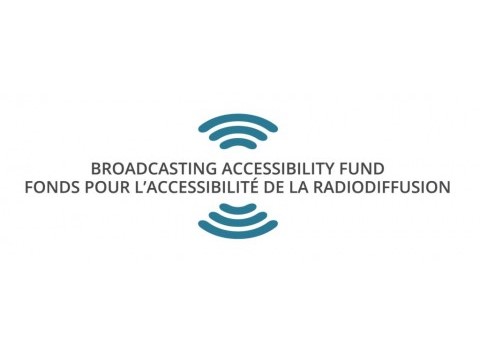
OTTAWA — The Broadcasting Accessibility Fund today announced it will award $398,016 in grants to four new projects to advance accessibility to broadcasting content for Canadians with disabilities.
These four projects represent the completion of the Fund’s sixth round of grants, with a total commitment of approximately $3.7 million to date, to address gaps in broadcasting accessibility.
The projects approved by the Fund’s board of directors are:
- CapScribe 3.0 — Inclusive Media & Design and IDRC — $160,000: This project will build upon previous work undertaken in CapScribe 2.0 by creating a more efficient workflow, an upgraded interface design addressing a wide range of accessibility needs, and pilot integration with Learning Management Systems. Captioning and description modules will be enhanced and support for ASL/LSQ (American Sign Language/Langue des Signes Québéquoise) video will be provided along with new features promoting ease of use, automation and team collaboration. This project is designed as a platform-neutral solution that would support academic institutions, as well as broadcasters and other industries by providing software and training materials freely.
- Improving live captioning delivery quality with Artificial Intelligence — PAVO Digital Inc. — $131,216: This project will consolidate several captioning software tools into a single deliverable product, building on two previous projects funded by the Fund. The final phase would complete the AI elements needed to bring a product to market, including the role of captioners as supervisors of AI-based speech to text outputs; an interface to support the captioning supervision role; development of a real time sentence prediction engine; full integration of the software into the PAVO captioning offerings; performance benchmarking; and system evaluation.
- Evaluation and testing of Langue des Signes Québéquoise content: A first step towards developing signed content at Radio-Canada — Radio-Canada (French language) — $31,800: This initiative will explore promising opportunities for signed content in Langue des Signes Québéquoise (LSQ). It involves conducting research to determine the status of LSQ users and identify: (1) their content needs, (2) initiatives that have led to signed content at the national and international levels and (3) current approaches to signing audio and video content. This research will offer a better understanding of the role that LSQ can play for consumers by researching the current level of LSQ content availability, the interests and needs of consumers and current solutions for integrating LSQ into audio and video media. These results are intended to serve as the basis for Radio-Canada’s future development of a relevant, useful and financially sustainable LSQ content strategy, and results will be openly shared with other broadcasters and organizations interested in LSQ content development.
- Certificate Pilot Project (30 credits) in Inclusive Media with a focus on developing captioning and audio description skills — Université de Montréal (French-language) — $75,000: This project will see the development of the first inclusive-media certificate program in French offered by a Canadian university, to provide professionals with advanced training in closed captioning, sign language videography, audio description and scriptwriting techniques, and to support the broadcasting industry’s training needs. The certificate program would consist of 10 courses to be developed by Labo CinéMédias and offered by the University of Montreal’s Department of Art History and Film Studies for a one-year trial period. This project fills a gap in the broadcasting industry for the training and education of French-language captionists and descriptors available to the public. The University of Montreal has previously worked with Ryerson University on the latter’s inclusive media course series.
“I’m very impressed with these four new initiatives,” said board of director chair Marcia Yale, in a press release. “These projects fit perfectly with the Fund’s mandate and objectives; all are characterized by partnerships, transparency and broad dissemination of results, which are key elements of the Fund’s grant program.”
“The board of directors was very pleased with the number of strong applications we received this year,” added the Fund’s CEO and funding officer, Richard Cavanagh. “These projects are excellent examples of the work we wish to see in response to future calls for Letters of Intent, with many building upon previous work undertaken through previous grants from the Fund.”
The Fund’s next call for letters of intent, the first step in the application process, will be issued in February 2021.
Created as part of the tangible benefits package associated with Bell Canada’s acquisition of CTV, the Broadcasting Accessibility Fund is an independent and impartial funding body that supports innovative projects to increase the accessibility of broadcasting content in Canada.




